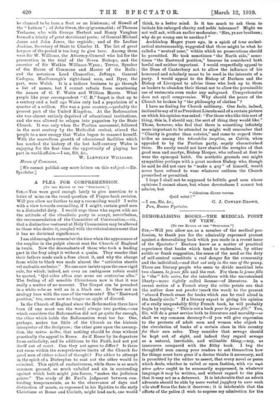A PLEA FOR COMPREHENSION.
LTO THE EDITOR OF TEE "SPECTATOR."] Sin, —You were good enough lately to give insertion to a letter of mine on the vexed question of Prayer-book revision. Will you allow me further to say a reconciling word? I write with a view towards reconciling, if I might, certain good men to a distasteful duty. I would urge those who regret with MC the attitude of the ritualistic party to accept, nevertheless, the recommendation of the Committee of Convocation,—viz., that a distinctive vestment at Holy Communion may be allowed to those who desire it, coupled with the rubrical statement that it has no doctrinal significance.
I am old enough to remember the time when the appearance of the surplice in the pulpit almost rent the Church of England in twain. Now the descendants of those who took a leading part in the fray adopt it without a qualm. They wonder that their fathers made such a fuss about it, and why the change from white to black was made almost the " articulus stantis vel cadentis ecclesiae." No one now insists upon the once rigid rule, for which, indeed, not even an ambiguous rubric could be quoted, " Qui color albus erat nunc est contrarius albo." The feeling of all sensible Churchmen now is that it was really a matter of no moment. The Gospel can be preached in a white robe as well as in a black one. Is there not an analogy here with the case of the vestments ? The " Eastward position," too, seems now no longer an apple of discord.
In the Church of England since the Reformation there have been (if one must use the word) always two parties,—one which considers the Reformation did not go quite far enough, the other which holds the Reformation went too far. One, perhaps, makes too little of the Church as the historic interpreter of the Scripture ; the other goes upon the assump- tion, the rpcirrov 4.f Os, that nothing should be done without practically the appeal to Rome. As if Rome by its departure from catholicity, and its additions to the Faith, had not put itself out of court. Can they not agree to differ P Is there not room within the comprehensive limits of the Church for good men of either school of thought ? For either to attempt in the spirit of a Diotrephes to cast out the other would be criminal. This spirit of exclusiveness, while there is so much common ground, so much unbelief and sin in contending against which both might join forces, "makes the judicious grieve." The study of St. Paul's judgment between con- tending temperaments, as to the observance of days and distinction of meats, as expressed in his Epistles to the early Christians at Rome and Corinth, might lead each, one would
think, to a better mind. Is it too much to ask them to imitate his enlarged charity and noble tolerance P Might we not well ask, with an earlier moderator: "Sirs, ye are brethren ; why do ye wrong one to another P " Archbishop Magee years ago, in a spirit of true ecclesi- astical statesmanship, suggested that there might be what he called a " neutral zone," within which no prosecutions should be permitted. He took sometimes " the North side," some- times "the Eastward position," because he considered both lawful and neither important. I would respectfully appeal to the Dean of Canterbury not to allow the influence of his honoured and scholarly name to be used in the interests of a party. I would appeal to the Bishop of Durham and the Bishop of Liverpool to advise those who look up to them as leaders to abandon their threat not to allow the permissible use of vestments even under any safeguard. Comprehension does not spell compromise. Why should the peace of the Church be broken by " the philosophy of clothes " ?
I have no feeling for Church millinery. One feels, indeed, inclined to say of it as President Lincoln said of a certain picture on which his opinion was asked: "For those who like this sort of thing, this is, I should say, the sort of thing they would like." Those, however, who feel that there is something infinitely more important to be attended to might well remember that "Charity is greater than rubrics," and come to regard these trifles as among the tolerabiles ineptia,e, as Calvin, when appealed to by the Puritan party, sagely characterised them. He surely would not have shared the scruples of that good man and martyr, Bishop Hooper, who refused at first to wear the episcopal habit. On aesthetic grounds one might sympathise perhaps with a great modern Bishop who, though he said he did not care to "make a guy" of himself, would never have refused to wear whatever uniform the Church prescribed or permitted.
I hope I shall not be supposed to belittle good men whose opinions I cannot share, but whose devotedness I cannot but admire, but " ridentem dicere verum Quid vetat ? "














































 Previous page
Previous page